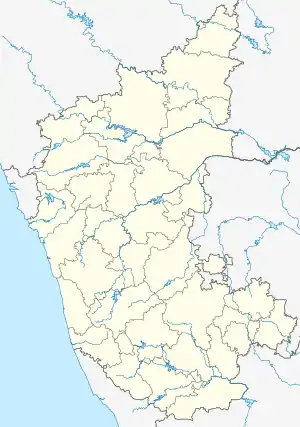Bannerghatta National Park
Bannerghatta National Park is a national park in India, located near Bangalore, Karnataka. It was founded in 1970 and declared as a national park in 1974.[1] In 2002, a small portion of the park became a zoological garden, the Bannerghatta Biological Park.[2]
| Bannerghatta National Park | |
|---|---|
IUCN category II (national park) | |
 Tiger at the Bannerghatta National Park | |
 Bannerghatta Biological Park | |
| Location | Karnataka, India |
| Nearest city | Bangalore |
| Coordinates | 12°48′03″N 77°34′32″E |
| Area | 260.51 km2 (100.58 sq mi) |
| Established | 1974 |
| Governing body | Ministry of Environment and Forests, Government of India |
| bannerghattabiologicalpark | |
There are ancient tembles in the park for worship and it is a destination for trekking and hiking. Within the national park area are six rural villages enclosed within three large enclosures for sheep and cattle farming.[3] This park offers a wide range of diverse wildlife to the exploradoras. Coming from the finest of Bengaluru, Karnataka, this park offers a guided bus tour all along the 6 km safari roads, which is specially made for safarists and foreign tourist gatherers.
Geography
The 65,127.5 acre (260.51 km2[4]) national park is located about 22 km south of Bangalore in the hills of the Anekal range with an elevation of 1245 - 1634m.[5] The park has a hilly terrain of granite sheets under moist deciduous forest valleys and scrubland on higher areas.[6] Sixteen villages border the park. Most of the national park consists of artificial forest, and some animals have been introduced.[7] The park is part of a wildlife corridor for elephants which connects the BR Hills and the Sathyamangalam forest. The park is contiguous with Talli reserve forest in the southeast and Bilikal forest in the south.[3]
Water sources
The park's rainfall is 700 mm per year. The Suvarnamukhi stream runs through the national park. On 15 May 2014, four bore wells were opened to provide water in dry times.[8]
Flora
Flora in the park include:[5]
- Narcissus latifolia
- Schleichera oleosa
- Terminalia tomentosa
- Sandalwood
- Neem
- T. arjuna
- Grewia tilaefolia
- Santalum album
- Tamarind
- Bamboo
- Eucalyptus
- Bauhinia purpurea
- Samanea saman
- Peltphorum pterocarpum
- Indian elephants
- gaur
- Indian leopard
- jackal
- fox
- sloth bear
- Indian gazelle
- spotted deer
- barking deer
- common langur
- bonnet macaque
- porcupine
- hare
- wild boar
- pangolin
- Royal Bengal tiger
- slender loris
- monitor lizard
- cobras
- python
- Russell's viper
- krait
- peacock
- crocodile
- Asiatic lion
- Flamingo
- Nilgai
- Blackbuck
- Pelican
- Indian wolf
- Striped hyena
- Himalayan black bear
Fauna from other countries
- Giraffe
- Hamadryas baboon

One hundred and one species of birds have been recorded in the park.[9] The fauna pose some risk to humans. In August 2012, a man was trampled to death by an elephant.[10] Occasionally, animals leave the reserve, coming into contact with humans. For example, elephants have been sighted on the Bantamweight-Anekal road which passes close to the park. In 2007, a leopard and her cubs entered a local school.[11]
Illegal mining around Bannerghatta national park
The park is threatened by multiple granite quarries operating around the national park.[12] These quarries are located alarmingly close to critical elephant corridors inside the national park such as Kardikal - Madeswara corridor.[13] While there is ban on mining and granite quarrying around the national park within a radius of One km from the boundary demarcated as "Safe Zone", quarries operate unabatedly. Vehicular movement is also uncontrolled. Tremors from the explosives used in the quarry operations are felt across a radius of at least five km adversely affecting elephants and other wild animals.[14]
Gallery
- Bannerghata National Park










See also
- Bangalore Division
- Bayalu Seeme
- Tyavarekoppa Lion and Tiger Safari
- Wildlife of India
References
- "Bannerghatta National Park" Karnataka.com Accessed 23 May 2014.
- "Bannerghatta Biological Park" Park website Accessed 23 May 2014.
- Brondizio E. and Moran E. "Human-Environment Interactions." Springer, 2012 p131 ISBN 9400747802, 9789400747807.
- Karnataka Government Gazette Notification vide No:FEE302 FWL2011-(11), Bangalore, dated:27-12-2011
- "Bannerghatta National Park" Bengaloorutourism.com Accessed 24 May 2014.
- "Bannerghatti national park" Arocha organisation website. Accessed 23 May 2014.
- Khanna B. "Safari closed in Bannerghatta zoo due to foot and mouth disease." Bangalore Citizen Accessed 24 May 2014.
- "Bannerghatta National Park gets four bore wells to quench thirst of animals." The Hindu 15 May 2014. Accessed 24 May 2014.
- Lepage D. "Bannerghatta National Park bird checklist" Avibase website. Accessed 24 May 2014.
- Vattam S. "Bannerghatta National Park now open for trekking" newindianexpress.com 21 November 2012. Accessed 24 May 2014.
- "Sights, sounds and smells from Bangalore: Leopards on prowl on Bannerghatta main road". Bangalorebuzz.blogspot.com 26 September 2007. Accessed 8 May 2014.
- "'Save Bannerghatta National Park': Bengaluru activists approach Centre". www.thenewsminute.com. Retrieved 30 October 2019.
- Thakur, Aksheev (21 March 2018). "The curious case of the disappearing forest". Deccan Chronicle. Retrieved 30 October 2019.
- "Protect Bannerghatta buffer zone from quarrying: Activists". The New Indian Express. Retrieved 30 October 2019.
External links
 Bannerghatta National Park travel guide from Wikivoyage
Bannerghatta National Park travel guide from Wikivoyage- Criticisms of the National Park[Usurped!], The Hindu
- Lions’ club grows at Bannerghatta park
- Butterfly Park, The Hindu
- Rangers in India capture tiger that killed girl, 5. Orlando Sentinel, 15 September 1992.
- Travel Guide to Bannerghatta National Park, Onebangalore.com.
- Bannerghatta National Park, Karnataka Tourism Official Website.
- "Bangalore Bytes". Archived from the original on 4 March 2016. Retrieved 22 June 2017.